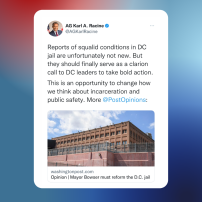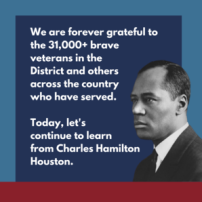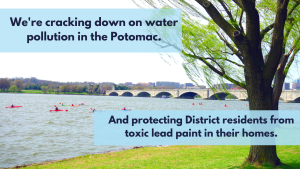Reforms at the DC Jail are Long Overdue
Recent reports of squalid conditions in the District’s jail are unfortunately not new. But they should finally serve as a clarion call to District leaders to take bold action. Instead of making modest improvements to our crumbling jail, the District must use this moment to take a different approach—one that reduces harm, advances public safety, and recognizes the human dignity of the individuals who are detained.
My office serves as Counsel to the Department of Corrections. But as the elected, independent attorney general—statutorily required to work in the public interest—I must speak out. Last Thursday, I testified at the DC Council hearing on conditions at the jail and I wrote an op-ed in the Washington Post last Friday that goes into more detail on the need for reforms.
Concerns about conditions in the jail have been raised since almost the moment it was built. Then, just last week, the U.S. Marshals reported indications of systemic failures in the jail. As many have noted, concerns about conditions in the jail received little attention until they were raised by the mostly white defendants accused of perpetrating the January 6 insurrection. Still, we should view this as an opportunity to make meaningful changes in how we think about incarceration and public safety.
As attorney general, I have had the opportunity to visit jails around the world and see first-hand that there is another way. It is in all of our interest to have a jail that supports reintegration while protecting public safety, especially since the vast majority of people confined there will rejoin their communities. It is time that we take a different course—we must be bold, innovative, and committed to achieving a different result than decades of past practice.
Read more in these articles from the New York Times and Politico.
Thank you.

Karl A. Racine
Attorney General
Going to Trial Against the Trump Presidential Inaugural Committee
Last week, a judge issued an order allowing the most important claims in our lawsuit against the Trump Presidential Inaugural Committee and the Trump Hotel DC to move forward. We are going to trial.
As part of my office’s broad responsibility to police non-profit funds, my office sued the 58th Presidential Inaugural Committee (PIC) for misusing funds to enrich the Trump family. The PIC is a nonprofit, and there are rules about how it can spend its money.
The PIC lined the pockets of the Trump family by paying vastly inflated prices for event space at the Trump Hotel. The PIC overpaid market rates by more than $1 million—effectively transferring donors’ money into hotel profits.
This violates the District’s nonprofit laws, and we are moving toward a trial. Through the case, we have uncovered extensive evidence showing the Committee was used to personally enrich the Trump family—violating nonprofit law. This abuse and corruption cannot stand.
With this lawsuit, we’re seeking to recover the nearly $1.1 million that improperly benefitted the Trump family. We are asking the Superior Court to direct those funds to another reputable nonprofit that is engaged in civic-focused charitable work.
To learn more, read this CNN article.
Remembering Charles Hamilton Houston Around Veteran's Day
Last Thursday, we recognized the 31,000+ brave veterans in the District and others across the country who have served and defended our country. We are forever grateful to them, and inspired by their service.
One local veteran has been a particular role model for me: Charles Hamilton Houston. Houston served as a First Lieutenant in World War I while in the segregated U.S. Army. He said if he made it through the war, he would study law and use his time “fighting for men who could not strike back."
After returning from the War, he delivered in his mission. He went on to law school, served as dean of Howard University Law School and then the first general counsel of NAACP, played a critical role fighting against Jim Crow laws, and mentored a generation of Black attorneys including Thurgood Marshall. Every day, he used the law to stand up for those who can't stand up for themselves. His memory continues to inspire me in my work everyday, and I think there's something for all of us to learn from his example.
Voices from Across My Office
At the Office of the Attorney General, we’re proud of the broad array of work we do on behalf of the District and the hundreds of employees who make our agency run. I recently launched “Voices from Across My Office,” a new blog series highlighting some of the people behind our efforts and the variety of work they do to support, defend, and stand up for District residents. So far, we have spotlighted my office’s Family Services Division, the Commercial Division, the Personnel, Labor, and Employment Division, the Public Advocacy Division, and the Child Support Services Division. Each week for the next couple of months, a new division will be highlighted. Learn about some of the people who work in these divisions and the important work they do for District residents. Follow my Medium Page for more.
DC Parents: Don’t Wait, Vaccinate!
At the end of October, the Centers for Disease Control and Prevention approved the COVID-19 vaccine for children ages 5 through 11. If your children can get vaccinated, they should do so. The vaccine is safe and free, and you do not need to have health insurance to get it.
24,600 doses will be available in the District to distribute to young people, and they are available at pharmacies, hospitals, and health clinics. District families can help keep their children safe from the COVID-19 virus by discussing the vaccine with their health care providers. The vaccine will not only help keep kids safe and reduce the impact of COVID-19 if they get it but will also help reduce the spread to other family and community members.
From November 8-November 20, special pop-up vaccination clinics throughout the District will be distributing the vaccine for children—including many sites located at schools. These special pop-up vaccination clinics are different from the walk-up vaccination sites for people 12 and over.
To learn more about how to get your children vaccinated, read this article from WAMU, which includes dates and times for COVID-19 vaccine clinics for children ages 5 through 11.
Click here to find other opportunities to get vaccinated today, including at pharmacies and health clinics across all eight wards. If you are unable to leave your home, call 1-855-363-0333, and the vaccine will be brought to you.
For any questions regarding the vaccine program, please email vaccinatedc@dc.gov.
Utility Assistance to Avoid Shutoffs
DC Water is planning to start disconnecting service if you have unpaid bills—but there are federal and local programs that can help. Call 202-354-3600 or email cares@dcwater.com to learn more if you need assistance. Read more from DCist.
Celebrating Native American Heritage Month
Happy Native American Heritage Month! This month we celebrate Native American heritage and culture and re-commit to elevating Indigenous people’s voices.
We also remember the mass atrocities inflicted on Indigenous people in the name of colonialism. Denouncing hatred, bigotry, and discrimination requires that we also acknowledge our ugly past.
The Chesapeake Bay Watershed is an area full of rich history that can teach many lessons about our country’s treatment of native people and the continuing struggle for justice. Learn more here.
Speaking at the Embassy of the Netherlands
I was honored to speak last month at the Embassy of the Netherlands about innovations in youth justice and share my perspective about effective approaches, from violence interruption to diversion programs and restorative justice.
It was wonderful to meet Ambassador Haspels, who helped set up the South Africa Truth and Reconciliation Commission, and clearly knows the power of restorative justice.
Restorative Justice is victim-centered, and we know that when victims choose to participate, they find closure and healing through the process. The program also helps heal those charged with a crime as well, giving them a chance to show accountability, build empathy, and learn from their mistakes.
The over-criminalization of children, especially Black children, has not made our society safer, but programs like restorative justice will. I’m proud of my office’s work to address these tough problems, and I’m always glad to share lessons learned with other communities—or even other countries.
Dear Supreme Court: 3.5 million Americans in Territories Deserve Same Federal Benefits
3.5 million Americans living in US territories—98% of whom are ethnic minorities—are denied equal access to programs, like Supplemental Security Income (SSI) and the Supplemental Nutrition Assistance Program (SNAP). Continuing to treat them like second-class citizens relies on racist legal precedent that should be overruled. The Supreme Court has a chance to right this wrong and last week heard oral arguments in a case on these issues.
Every American should receive equal representation and support, no matter where they live. It is illogical and unfair to exclude Americans from receiving federal support because they live in a U.S. territory or the District, rather than in a state. I led 18 attorneys general in urging the Supreme Court to reject the racist precedent that has allowed for the differential treatment of U.S. territories and help ensure that federal benefits can help Americans who desperately need resources out of poverty. Read more about this case in my op-ed in USA Today.
Protecting Health and the Environment
Last week, I announced that my office successfully resolved two environmental enforcement actions—winning a judgment in a water pollution lawsuit and reaching a settlement in a lead paint investigation—and filed a new lawsuit against a developer that polluted District waters. The District’s strong environmental laws protect our natural resources and the health and safety of all our residents. We know that exposure to toxic lead paint and other pollutants can cause lasting harm, particularly to children. And low-income communities of color are disproportionately impacted by toxins in the air and water. These enforcement actions put businesses on notice that if they endanger vulnerable DC residents by polluting our air, land, or water, the Office of the Attorney General will not let them get away with it.
Calling on District Funeral Homes to Post Their Prices Online
Earlier this month, I called on six funeral homes throughout the District to fully comply with the District’s emergency COVID-19 law, which requires funeral homes to include pricing information about funeral goods and services on their websites. As the COVID-19 pandemic raged in 2020, my office proposed, and the DC Council passed, legislation requiring DC funeral homes to display their pricing in a clear and transparent manner. This requirement ensured that consumers confronting the death of loved ones would not have to navigate the complex and ambiguous pricing for end-of-life services. Read more from the Washington Informer.






